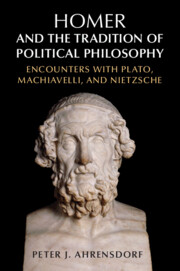Book contents
- Homer and the Tradition of Political Philosophy
- Homer and the Tradition of Political Philosophy
- Copyright page
- Dedication
- Contents
- Acknowledgments
- Introduction
- 1 The Contest between Homer and Plato and the Homeric Education on the Gods
- 2 The Homeric Education in Human Excellence
- 3 Plato’s Critique of the Homeric Education
- 4 Homer and Machiavelli on Education and Human Excellence
- 5 Nietzsche on the Contest between Homer and Plato
- Conclusion
- Bibliography
- Index
3 - Plato’s Critique of the Homeric Education
Published online by Cambridge University Press: 18 August 2022
- Homer and the Tradition of Political Philosophy
- Homer and the Tradition of Political Philosophy
- Copyright page
- Dedication
- Contents
- Acknowledgments
- Introduction
- 1 The Contest between Homer and Plato and the Homeric Education on the Gods
- 2 The Homeric Education in Human Excellence
- 3 Plato’s Critique of the Homeric Education
- 4 Homer and Machiavelli on Education and Human Excellence
- 5 Nietzsche on the Contest between Homer and Plato
- Conclusion
- Bibliography
- Index
Summary
Plato criticizes Homer’s effort to promote religious skepticism through his portrayal of the gods for overestimating the power of human reason and underestimating the power of human passions, and he criticizes Homer’s education concerning human excellence for inadvertently glamorizing the passionate and tragic hero Achilles and all too effectively hiding his own example as a philosophic thinker behind the mask of the divinely inspired singer. Plato therefore replaces the Homeric education with a new, poetic, Platonic education that presents Socrates – the fearless, dispassionate, self-sufficient, apolitical philosopher who promulgates the pious, edifying, and reassuring doctrines of the separate Forms and the Immortality of the Soul – as an explicit object of admiration and model for imitation.
Keywords
- Type
- Chapter
- Information
- Homer and the Tradition of Political PhilosophyEncounters with Plato, Machiavelli, and Nietzsche, pp. 132 - 193Publisher: Cambridge University PressPrint publication year: 2022

